Unit6课文译文
- 格式:doc
- 大小:15.50 KB
- 文档页数:1
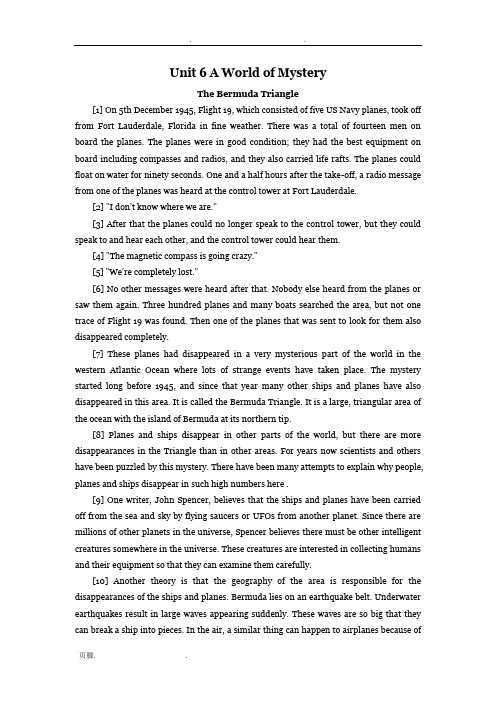
Unit 6 A World of MysteryThe Bermuda Triangle[1] On 5th December 1945, Flight 19, which consisted of five US Navy planes, took off from Fort Lauderdale, Florida in fine weather. There was a total of fourteen men on board the planes. The planes were in good condition; they had the best equipment on board including compasses and radios, and they also carried life rafts. The planes could float on water for ninety seconds. One and a half hours after the take-off, a radio message from one of the planes was heard at the control tower at Fort Lauderdale.[2] "I don't know where we are."[3] After that the planes could no longer speak to the control tower, but they could speak to and hear each other, and the control tower could hear them.[4] "The magnetic compass is going crazy."[5] "We're completely lost."[6] No other messages were heard after that. Nobody else heard from the planes or saw them again. Three hundred planes and many boats searched the area, but not one trace of Flight 19 was found. Then one of the planes that was sent to look for them also disappeared completely.[7] These planes had disappeared in a very mysterious part of the world in the western Atlantic Ocean where lots of strange events have taken place. The mystery started long before 1945, and since that year many other ships and planes have also disappeared in this area. It is called the Bermuda Triangle. It is a large, triangular area of the ocean with the island of Bermuda at its northern tip.[8] Planes and ships disappear in other parts of the world, but there are more disappearances in the Triangle than in other areas. For years now scientists and others have been puzzled by this mystery. There have been many attempts to explain why people, planes and ships disappear in such high numbers here .[9] One writer, John Spencer, believes that the ships and planes have been carried off from the sea and sky by flying saucers or UFOs from another planet. Since there are millions of other planets in the universe, Spencer believes there must be other intelligent creatures somewhere in the universe. These creatures are interested in collecting humans and their equipment so that they can examine them carefully.[10] Another theory is that the geography of the area is responsible for the disappearances of the ships and planes. Bermuda lies on an earthquake belt. Underwater earthquakes result in large waves appearing suddenly. These waves are so big that they can break a ship into pieces. In the air, a similar thing can happen to airplanes because ofsudden strong winds.[11] As with Flight 19, many boats and planes have reported that their magnetic compasses stop working properly in the Bermuda Triangle. Normally a magnetic compass points towards magnetic north . However, the Bermuda Triangle is one of the two places on Earth in which a compass points towards true north. Therefore, there is something strange about the magnetic properties of the area.[12] Many people have found these explanations difficult to believe. However, the most recent theory has a scientific basis and is more believable. The discovery of methane gas on the seafloor of the Bermuda Triangle started a scientist, Dr. Mclver, thinking about an explanation for the mysteries. Sometimes large amounts of the gas escape from the seafloor and rise into the air. This could produce large waves on the surface which would make a ship sink. When the gas mixes with air, it could also cause a ship's engine to stop or it could start a fire. Similarly, as the mixture rises into the air, it could cause an airplane's engine to stop or explode. The explosions would break a ship or a plane into tiny pieces.[13] This latest theory has yet to be proved but seems to offer a better explanation as to why Flight 19 and all the other planes, ships and people have disappeared in the Bermuda Triangle.百慕大三角1 1945 年12 月5 日,佛罗里达州的劳德代尔堡,天气晴好,由5 架美国海军飞机组成的第19 飞行小队从这儿起飞。
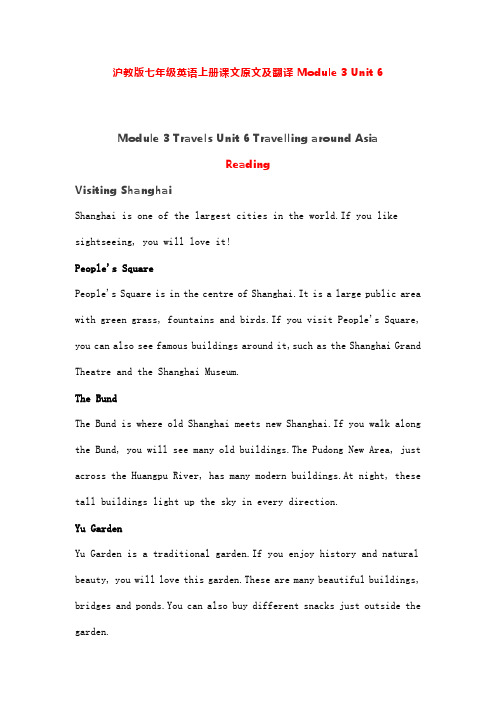
沪教版七年级英语上册课文原文及翻译Module 3 Unit 6Module 3 Travels Unit 6 Travelling around AsiaReadingVisiting ShanghaiShanghai is one of the largest cities in the world.If you like sightseeing, you will love it!People's SquarePeople's Square is in the centre of Shanghai.It is a large public area with green grass, fountains and birds.If you visit People's Square, you can also see famous buildings around it,such as the Shanghai Grand Theatre and the Shanghai Museum.The BundThe Bund is where old Shanghai meets new Shanghai.If you walk along the Bund, you will see many old buildings.The Pudong New Area, just across the Huangpu River, has many modern buildings.At night, these tall buildings light up the sky in every direction.Yu GardenYu Garden is a traditional garden.If you enjoy history and natural beauty, you will love this garden.These are many beautiful buildings, bridges and ponds.You can also buy different snacks just outside the garden.参观上海上海是世界上最大的城市之一。

UNIT6What does it feel like to help dying patients through their final days? Experience it through the eyes of hospice nurse Jill Campbell, who does her job with grace, compassion, and gratitude.1.Outside, it's noisy on this busy block of row houses in Baltimore. But inside one tidy living room, all is quiet except for the sound of a woman's raspy breathing. The patient is huddled in an easy chair under a handmade pink-and-blue afghan, a knit cap on her head and booties on her feet. She has trouble staying warm these days. Her cancer has returned with a vengeance and she has only a few weeks to life. Hospice nurse Jill Campbell kneels down beside her patient, listens to her breathing, and then checks her blood pressure. Campbell has already hauled in oxygen tanks, showed family members how to work them, organized the medicine, and assessed how her patient has been eating and sleeping.2.But now is a moment to connect one-on-one. Campbell wraps her hands aro und the woman’s hands and rubs them together to warm them. She looks into her face. “are you feeling a little better?” she asks softly.3.Getting to know her patients and helping them through the toughest time of their lives is what Campbell, 43, appreciates most about being a hospice nurse. “I don’t know of another position where you can do more for people,” she says.4.Her patients have all been told that they have six months or less to live. Rather than continue with often-difficult or painful treatments that probably won’t extend their lives, they have decided to stop trying for a cure. Instead, with the help of hospice care, they’ll focus on comfort and on living whatever they have left of their lives to the fullest ---usually in their own home.5.Being able to die at home is a major part of the appeal of hospice, but patients and family members may not see it that way at first. “A lot of people still view hospice as giving up and letting the disease in,” says Campbell. That’s why the decision to c all in hospice care can be an incredibly difficult one for a family to make. Once they do, though, most patients and their families soon understand the value of having a team of dedicated professionals---including social workers, health aides, chaplains, and nurses---work together to provide not only physical but also emotional and spiritual support. 帮助即将离世的患者度过最后的时光会是怎样的感受呢?让我们借助吉尔·坎贝尔的所见经历这一切吧。

Unit6 carrying capacity:earth’s bottom lineIt takes no stretch of the imagination to see that thehuman species is now an agent of change of geologicproportions. We literally move mountains to mine theearth’s minerals, redirect rivers to build cities in thedesert, torch forests to make way for crops and cattle,and alter the chemistry of the atmosphere in disposing of our wastes. At humanity’s hand, the earth isundergoing a profound transformation-one withconsequences we cannot fully grasp.没有一点点想象明白人类带来地理比例的变化,我们移山开采地球的矿物质,重定向的河流在沙漠中建造城市,为了农作物和畜牧烧森林来让路,并改变大气的化学处理的废物。
对于人类,地球正在经历一个深远的改变-这一结果我们不能完全控制.It may be the ultimate irony that, in our efforts tomake the earth yield more for ourselves, we arediminishing its ability to sustain lifeof all kinds,humans included. Signs of environmental constraintsare now pervasive. Cropland is scarcely expandingany more, and a good portion of existing agriculturalland is losing fertility. Grasslands have been overgrazed and fisheries overharvested, limiting theamount of additional food from these sources. Waterbodies have suffered extensive depletion and pollution, severely restricting future food production andurban expansion. And natural forests-which helpstabilize the climate, moderate water supplies, and harbor a majority of the planet’s terrestrial biodiversity-continue to recede.它可能是最终的讽刺,在我们努力使地球产量更多,我们正在消弱其维持生命的能力。
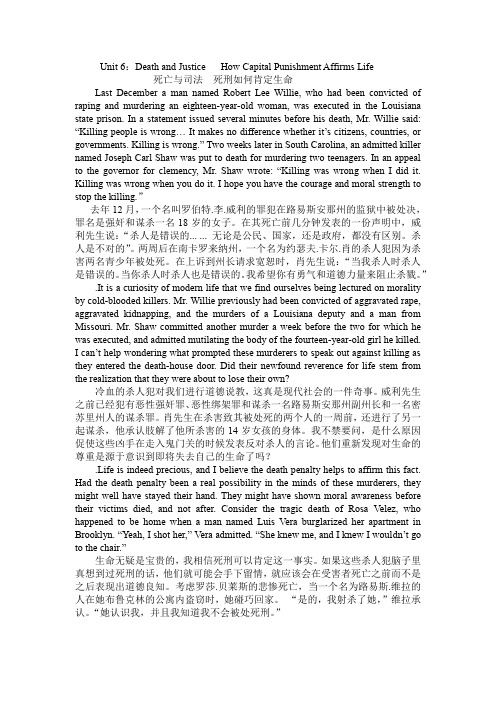
Unit 6:Death and Justice How Capital Punishment Affirms Life死亡与司法死刑如何肯定生命Last December a man named Robert Lee Willie, who had been convicted of raping and murdering an eighteen-year-old woman, was executed in the Louisiana state prison. In a statement issued several minutes before his death, Mr. Willie said: “Killing people is wrong… It makes no difference whether it’s citizens, countries, or governments. Killing is wrong.” Two weeks later in South Carolina, an admitted killer named Joseph Carl Shaw was put to death for murdering two teenagers. In an appeal to the governor for clemency, Mr. Shaw wrote: “Killing was wrong when I did it. Killing was wrong when you do it. I hope you have the courage and moral strength to stop the killing.”去年12月,一个名叫罗伯特.李.威利的罪犯在路易斯安那州的监狱中被处决,罪名是强奸和谋杀一名18岁的女子。
在其死亡前几分钟发表的一份声明中,威利先生说:“杀人是错误的... ... 无论是公民、国家,还是政府,都没有区别。

Unit6 I’m going to study computer science.【重点词语/短语用法解析】1. want to be/become + (职业)名词:“想要成为…..”I want to be (be) a scientist when I grow up.2. write stories 写故事tell stories 讲故事3. keep on doing sth. 继续做某事(表动作的反复)keeping doing sth. 保持做某事(表动作或状态的持续)4. be sure about +名/代/V-ing“肯定”Are you sure about that?make sure (that)+从句“…...确保...…”Make sure that both doors are closed when you go out.5. learn sth. We must learn English every day.learn to do sth. I am going to learn to play ( play) the piano.6. discuss v. 讨论;商量名词是discussiondiscuss with sb. 与某人讨论:Discuss this question with your partner.Let’s discuss this problem. 让我们讨论一下这个问题。
All we need now is action, not discussion. 我们现在需要的是行动,不是讨论。
7. be able to do sth. 能够做某事(1)can : can+动词原形,无人称和数的变化。
只能用于一般现在时和一般过去时,不能用于将来时。
be able to + 动词原形,有人称和数的变化,可用于多种时态。
(2)can 常指客观上能够;be able to 更侧重于经过努力、克服一定困难有能力做成某事。

八年级下册英语书unit6课文翻译英语翻译教学在八年级英语整体教学中占有非常重要的地位, 翻译教学的作用是显而易见的。
以下是店铺为大家整理的八年级下册英语unit6的课文翻译,希望你们喜欢。
八年级下册英语书课文翻译:unit 62d 你觉得愚公的故事怎么样?我认为他真的很有趣。
愚公找到了一个解决问题的好方法。
真的吗?我认为它有点愚蠢。
移山似乎是不太可能的。
但这个故事试图告诉我们如果你去努力一切皆有可能!愚公一直尝试而且没有放弃。
我还是不赞同你的观点。
我以为我们应该尝试着去寻找一些其他的方法来解决问题。
但是不把山移开愚公还能做什么呢?这个,有很多其他的方法。
例如,他可以建一条公路。
那要比移山更好更快!对于这个故事你们有不同的观点,并且你们两个人都是对的。
一个故事有许多面,也有许多种理解的方式。
3a 1.谈论的是哪本书?主要的人物是谁?他是一个什么样的人?1979年11月,英国学生能够观看一部叫《美猴王》的新电视节目。
他们大多数是第一次听到这个故事。
然而,这个故事对中国孩子来说并不新鲜。
美猴王或孙悟空是传统的中国书籍《西游记》中的主要人物。
美猴王不仅仅是一只普通的猴子。
事实上,甚至有时他看起来不像一只猴子!这是因为他能根据他的形状和大小做出72种变化,把自己变成不同的动物和物体。
但是除非他能隐藏他的尾巴,他不能把自己变成一个人。
为了与坏人斗争,孙悟空使用一根魔力金箍棒。
有时他能让金箍棒变小以至于可以放在耳朵里。
有时,他能让它变得又大又长。
美猴王让中国的孩子兴奋了好多年。
30多年前这个节目一推出,西方的孩子对读这个故事很感兴趣因为聪明的美猴王一直(与邪恶)斗争帮助弱者并从不放弃。
2b 韩赛尔与葛雷特韩赛尔和葛雷特与他们的父亲和继母住在森林附近。
有一年,天气太干旱了以至于粮食(作物)无法生长。
妻子告诉她的丈夫如果他不把孩子们扔到森林里让他们自生自灭,整个家庭就会灭亡。
葛雷特听到了这件事,并且韩赛尔制定了一个计划来拯救自己和他的妹妹。

人教版五年级上册英语Unit6课文朗读翻译点上方绿标即可收听音频◆◆◆翻译by @AliceUnit 6 In a nature park 在自然公园Look! There is a big white bird in the sky! 看!天空中有一只白色的鸟!There are many pretty fish in the river. 河里有好多美丽的鱼。
Wow! 哇!Is there a river in the park? 公园里有河吗?Yes, there is. 是的,有。
I'm hungry. Is there a restaurant beside the lake? 我饿了。
湖边有餐厅吗?No, there isn't. Look! I have some food. Let's share. 不,没有。
看!我有吃的。
我们分享吧。
Unit 6 A Let's try 一起试试What is in the park? 公园里有什么?Listen and tick the word you hear. 听并在你听到的单词打勾。
Look at the map of the park. 看公园的地图。
Is there a forest in the park? 公园里有森林吗?Yes, there is. Here! 是的。
有。
这呢!Cool! I love trees. 好酷!我喜欢树。
Unit 6 A Let's talk 一起说吧Children, let's go to the forest! 孩子们,我们去森林吧!Yeah! 好!Is there a river in the forest, Miss White? 怀特小姐,森林里有河吗?No, there isn't. 不,没有。
Is there a lake, Miss White? 怀特小姐,有河吗?Yes, there is and there are some small boats. 有,有河还有一些小船。

Unit 6Active reading (1)梦想成真当夜幕降临悉尼时,雨也开始悄悄地从夜空中飘落。
几百盏灯把澳大利亚体育场照得灯火通明,场内的声音震耳欲聋。
走向跑道时我看了一眼四周看台上无数的脸,但我的注意力还是很集中。
再过几分钟奥运金牌的归属就要见分晓了,它悬挂在远处,很诱人。
我心在剧烈地跳动,口干舌燥,肾上腺素猛增。
童年的梦想就要实现了,这种感觉真是太奇妙了:令人非常兴奋,又胆战心惊。
我知道,为了确保能梦想成真我必须强迫自己超越已知的极限。
我极力保持镇静,告诫自己不要紧张,要坚持按原计划做,按自己的节奏跑。
我知道那些俄罗斯姑娘起跑很快——这场比赛我落后俄罗斯运动员叶莲娜·普罗科霍洛娃不能超过十秒。
如果我做到这一点,冠军就是我的了。
我望着四百米跑道的起跑点,屏住了呼吸。
这些年来,在世锦赛、英联邦锦标赛以及欧洲锦标赛的八百米赛跑中我屡战屡败,饱受挫折。
现在,它再次横在我与奥运冠军头衔之间。
我的英国支持者在为我欢呼,声音特别大,就好像看台上只有他们是粉丝。
我听到他们喊我的名字,为我鼓劲加油,听到他们充满希望的呐喊。
宽阔美丽的体育场上到处飘扬着大不列颠联合王国的国旗,我感觉自己和观众融为了一体:我们有着同样的期盼,同样的梦想。
几个小时前,我的脚踝在跳远时受了伤,缠上了绷带,但是我忘掉伤痛,尽量把注意力集中在观众身上。
他们的叫喊声势浩大,使我精神振奋,我感到镇定自若。
我知道自己会全力以赴,拼尽全力跑完全程。
我感觉自己已经进入最佳状态。
我只要跑两圈就行了,就两圈。
跑完这两圈,过去两天以及28 年来所有情感和身体上的辛苦付出就将被胜利或者失败所淹没。
这一跑真是生死攸关。
我不断地告诉自己:也就是跑两分钟,谁都能跑两分钟。
发令枪响了,比赛正式开始。
第一圈还好,我跟其他人跑得一样快,但我觉得比平时要累得多,比我预想的要累得多。
这次锦标赛赛前长达数周的艰苦训练以及这两天激烈的比赛所带来的疲劳在我的赛跑过程中显现出来了。

Unit6 和自然和睦相处温德尔·伯利1和他们的对手工业经济的保护者一样,大自然的保护者有时也认为自然和人类是完全不同完全不相关联的两个实体。
就像工业家常常明确表明他们致力于对自然的完全占有或者如同他们所说,彻底征服自然一样,他们所说,彻底征服自然一样,大自然的保护者往往反对任何人类对大自然的侵犯。
大自然的保护者往往反对任何人类对大自然的侵犯。
2这两种极端对立的观点是危险的,最好是让人们意识到自然和人类彼此毫无关联的设想只是一种纯粹的理念;而实际情况并非如此。
3纯自然的环境不适合人类生活,人类不愿意也不能在此环境中长期生活,如果我们身处恶劣的气候达几个小时之久,就会渴望得到一些生活的必需品,抵御风寒的衣物、住所、熟食、亲友的陪伴——甚至想洗个热水澡,看看书,听听音乐。
4纯人文的环境同样也不适合人类生活,人类也不想长久地生活于这种环境之中。
很显然人类所处的环境越人造化,“天然”这个词就越被人珍视。
确实,我们可以说,我们当今的自然资源保护运动在很大程度上是工业革命的产物。
然资源保护运动在很大程度上是工业革命的产物。
渴望得到新鲜的空气,渴望得到新鲜的空气,渴望得到新鲜的空气,清澈的溪流,清澈的溪流,看到原始森林,大草原和大沙漠的人是哪些不再享有这些自然资源的人们。
5人们不可能离开自然生活,这是生态环境保护主义者的重要观点,,这是生态环境保护主义者的重要观点,但是人们又不可能在纯但是人们又不可能在纯自然的环境中生活而不对它作丝毫的改造。
这一点也适用于所有的生物。
人和其它生物都依赖于自然并且需要改造自然。
从某种意义上讲,我们所说的自然是各种各样生物和自然的力量在它们错综复杂的活动相互影响和变化的过程中所造成的变化的总和。
因为有了啄木鸟,自然就因此而有所不同,自然也因为有了生活在树干中的穿孔虫和蚂蚁以及在树下土壤里的细菌而有所不同,这些不同的组合就形成了世界。
6有些野生动物制造的变化是有利的,海狸制造水塘是出了名的,这些水塘后来成了肥沃的牧场,树和草原上的草可以防止水土流失。
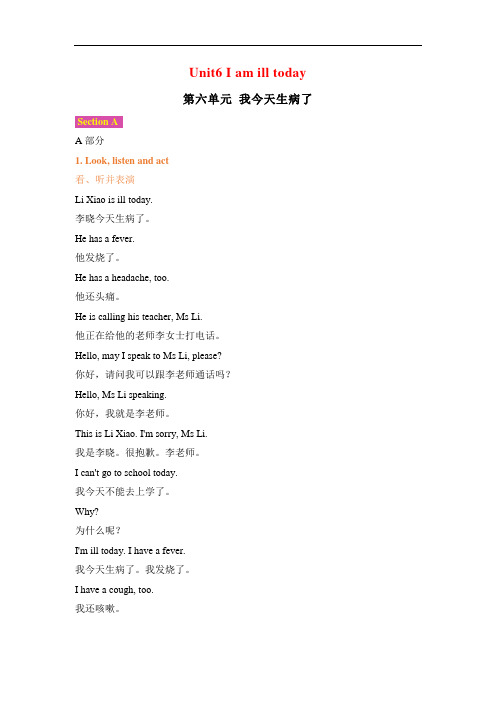
Unit6 I am ill today第六单元我今天生病了Section AA部分1. Look, listen and act看、听并表演Li Xiao is ill today.李晓今天生病了。
He has a fever.他发烧了。
He has a headache, too.他还头痛。
He is calling his teacher, Ms Li.他正在给他的老师李女士打电话。
Hello, may I speak to Ms Li, please?你好,请问我可以跟李老师通话吗?Hello, Ms Li speaking.你好,我就是李老师。
This is Li Xiao. I'm sorry, Ms Li.我是李晓。
很抱歉。
李老师。
I can't go to school today.我今天不能去上学了。
Why?为什么呢?I'm ill today. I have a fever.我今天生病了。
我发烧了。
I have a cough, too.我还咳嗽。
I'm sorry to hear that.听到这消息我很难过,Do you have a headache?你头痛吗?Yes, I do.是的。
Oh dear, you are very ill.哦,亲爱的,你病得很严重。
Please stay home and rest.请待在家里休息吧。
Thank you. Goodbye, Ms Li. 谢谢你。
再见,李老师。
Goodbye and take care.再见,保重身体。
2. Listen and say听和说I'm ill.我生病了。
Do you have a headache?你头痛吗?Yes. I have a headache.是的。
我头痛。
ill 生病的fever 发烧speak 说话cough 咳嗽headache 头痛hear 听到3. Listen, tick and match听录音,勾出正确答案,并搭配What’s the matter with the kids?孩子们怎么了?Zhou Lin, are you doing your homework? 周林,你在做作业吗?No, Mom. I can’t study. I’m ill.不,妈妈。

Unit6课文翻译课文AUnder the bombs:19451945:在炮火攻击下1.如今,当我回首往事,我很惊讶我居然能如此生动地回忆起轰炸开始的情况,那天的色彩和紧张的情绪仍然清晰地印在我的脑海中。
那天,我突然发现在晴朗的天空中出现了12 个银色的小点儿,离我很远,发出不正常的嗡嗡声,这种声音我以前从来没听过。
那年我七岁,就这样站在一片草地上,盯着天空中几乎不怎么移动的小点儿。
2.突然,就在附近,森林的边缘,我听到有巨大的炸弹爆炸的声音。
在我这个小孩的眼里,我看到的是泥土像巨大的喷泉一样冲到天上。
我想跑过去看看这个特别的景象,它让我感到害怕,但是也让我着迷。
我还没有习惯战争,也不能把这些飞机、炸弹的轰鸣、森林那边飞溅开来的泥土以及我看似必然的死亡联系成单一的因果关系。
没考虑有危险,我开始朝着投下炸弹的森林方向跑。
这时一只手拉住了我,把我拽倒在地上。
“趴下来,”我听到母亲发抖的声音,“不要动!”我还记得母亲把我紧紧贴在她身边,说的一些东西我并不知道,也并不理解其含义:那是一条死路。
3.到了晚上,我很困,但是我不能睡。
我们不得不撤离这座城市,像囚犯一样在夜间逃亡。
到哪儿去,我不知道,但是我知道逃跑突然变成了某种必须要做的事情,一种新的生存方式,因为每个人都在逃跑。
4.所有公路、大路、甚至是乡间小路上都是混乱的马车、拉车、自行车,上面装着包裹和箱子,还有数不清的吓坏了的人,他们无助地游走着。
一些人向东边跑,另一些人向西边、北边、南边跑;他们徒劳地跑着,实在累了就躺下来,睡一会儿,然后重新开始他们漫无目的的旅程。
我紧紧地把妹妹的手握在手里。
我母亲警告过,我们不能走失;但就算她没告诉我,我也能感觉到某种危险的灾难弥漫了整个世界。
5.我和妹妹在马车边走着。
这是一辆简易马车,车里铺着干草,在干草上,铺着一条棉布床单,我的祖父躺在上面。
他不能动,已经瘫痪了;也是地雷的受害者。
空袭一来时,所有人都冲到了壕沟里,只有我祖父留在没人的马路上。

Unit6 From Kaifeng to New York-Glory Is as Ephemeral asSmoke and Clouds A课文翻译(学术综合英语教材(研究生课程)P199)从开封到纽约——辉煌如过眼烟云尼古拉斯∙D∙克里斯托夫新的千禧年到来之际,纽约市俨然已成全世界最重要的城市、全球非正式的首都。
然而趁纽约人还没过度踌躇满志之前,不妨对华夏中原那座破落的开封城回眸一瞥。
开封,泥沙淤塞的黄河边的一座古都,在公元100时曾是全世界无与伦比的重要城市。
如果您对此闻所未闻,那这对美国人不啻为一个有益的警示——以广大的美国人民都应学习的未来的语言表达出来,一如前面的中文标题所示:“辉煌如过眼烟云。
”作为全世界独一无二的超级强国,今天看来仿佛美国的独霸全球乃是天经地义之事。
然而当我们对历史的洪流稍作回顾,便会惊觉世界的霸权是多么短暂,尤其是对各个城市而言。
如果要我选出公元200以前全世界最重要的一个城市,当非伊拉克的乌尔莫属。
公元前1500年,也许应是埃及的底比斯:公元前1000年时,没有哪个城市独领风骚,不过也许勉强可以投一票给黎巴嫩的赛登;公元前500年,应该是波斯的波西波里士;公元元年,是罗马;公元500年左右,也许是中国的长安;到了1000年,是中国的开封; 1500年,多半应是意大利的佛罗伦斯;两千年时,是纽约市; 2500 年时,极可能以上皆非。
今天的开封,脏乱而贫闲,甚至连省会都不是,地位卑微到连一个飞机场都没有。
它能沦落到这步田地更凸显了风水轮流转的道理。
I1 世纪时,作为中国宋朝的国都,正是它最繁华的时候。
它位于四大主要运河的交界,是当时的商业与工业中心。
当时开封城有三道城墙围绕,来自世界各地的商品都在这里集散。
它拥有百万以上的人口。
相比之下当时伦敦的人口大约只有15 000。
目前珍藏在北京故宫博物院的一幅古老卷轴,上面画的是古都开封的热闹与繁荣。
街道上成百上千的行人熙来攘往,成群的骆驼背负着来自丝绸之路的货物进城,林立的茶馆酒肆高朋满座。
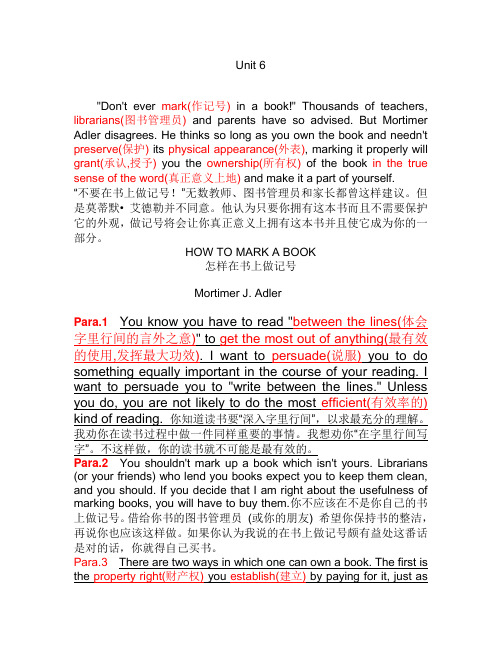
Unit 6"Don't ever mark(作记号)in a book!" Thousands of teachers, librarians(图书管理员)and parents have so advised. But Mortimer Adler disagrees. He thinks so long as you own the book and needn't preserve(保护) its physical appearance(外表), marking it properly will grant(承认,授予)you the ownership(所有权)of the book in the true sense of the word(真正意义上地) and make it a part of yourself.“不要在书上做记号!”无数教师、图书管理员和家长都曾这样建议。
但是莫蒂默•艾德勒并不同意。
他认为只要你拥有这本书而且不需要保护它的外观,做记号将会让你真正意义上拥有这本书并且使它成为你的一部分。
HOW TO MARK A BOOK怎样在书上做记号Mortimer J. AdlerPara.1You know you have to read "between the lines(体会字里行间的言外之意)" to get the most out of anything(最有效的使用,发挥最大功效). I want to persuade(说服)you to do something equally important in the course of your reading. I want to persuade you to "write between the lines." Unless you do, you are not likely to do the most efficient(有效率的) kind of reading. 你知道读书要“深入字里行间”,以求最充分的理解。

Unit 6Being ThereAnatole Broyard1. Travel is like adultery: one is always tempted to be unfaithful to one’s own country. To have imagination is inevitably to be dissatisfied with where you live. There is in men a centrifugal tendency. In our wanderlust, we are lovers looking for consummation.2. Only while traveling can we appreciate age. At home, for Americans at least, everything must be young, new, but when we go abroad we are interested only in the old. We want to see what has been saved, defended against time.3. When we travel, we put aside our defenses, our anxiety, and invite regression. We go backward instead of forward. We cultivate our hysteria.4. It is our best selves that travel, just as we dress in our best clothes. Only our passport reminds us how ordinary we actually are. We go abroad to meet our foreign persona, that thrilling stranger born on the plane. We’re going to see in Europe everything we have eliminated or edited out of our own culture in the name of convenience: religion, royalty, picturesqueness, otherness — and passion. We cling to the belief that other peoples are more passionate than we are.5. There’s an impostor in each of us — why else would we put on dark glasses and try to speak and look like the natives of another place? At home, we impersonate ourselves; when we’re abroad, we can try to be what we’ve always wanted to be. In spite of all the recent talk about roots, many of us are tired of our roots, which may be shallow anyway, and so we travel in search of rootlessness.6. Traveling began when men grew curious. The influence of the church, the traditional pattern of life, the lack of money and leisure had all restrained curiosity until the seventeenth century, when under pressure of scientific discoveries, the physical world began to gape open. It was then that people began to travel in search of the profane.7. Travel arrived together with sophistication, with the ability to see through or beyond one’s own culture, with the modern faculty of boredom. Something o f the Crusades survives in the modern traveler — only this is a personal crusade, an impulse to go off and fight certain obscure battles of his own spirit.8. Of course, one of the most common reasons for traveling is simply to get away. Freud said that we travel to escape father and the family, and we might add the familiar. There is a recurrent desire to drop our lives, to simply walk out of them.9. When we travel, we are on vacation —vacant, waiting to be filled. The frenzied shopping of some travelers is an attempt to buy a new life. To get away to a strange place produces a luxurious feeling of disengagement, of irresponsible free association. One is an onlooker, impregnable.10. We travel in summer, when life comes out of doors, and so we see only summery people, nothing of their sad falls, their long, dark winters and cruel springs. The places we visit are gold-plated by the sun. The flowers and trees are like bouquets thrown to history.11. And language — what a pleasure to leave our own language, with its clichés stuck in our teeth. How much better things sound in another tongue! It’s like having our ears cleaned out. So long as we don’t understand it too well, every other language is poetry.12. Because we travel for so many reasons —some of them contradictory —travel writing is like a suitcase into which the writer tries to cram everything. At its most interesting, it’s a continual tasting, the expression of a nostalgia for the particular. It’s a childish game of playing countries, as we used to play house.13. Travel writing describes a tragic arc: it begins with a rising of the spirit and ends in a dying fall. The earliest travelers went to see marvels, to admire the wonderful diversity of the world — but the latest travelers are like visitors sitting at the bedside of dying cultures. Early travelers fell in love at first sight with foreign places — but now we know only love at last sight, a kiss before dying, a breathing in of the last gasp. In some ancient societies, it used to be the c ustom for the son to inhale his father’s last breath, which contained his departing soul, and today’s travelers do something like this, too.14. Travel writing has become a quintessentially modern thing, the present regretting the past. We travel like insurance appraisers, assessing the damage. Militantly opposed to any kind of ethnic distinctions at home, we adore ethnicity abroad. Ironically, Americans need Europe more than Europeans do. To Parisians, for example, Paris is a place to live; for Americans, it’s a place to dream.15. “I do not expect to see many travel books in the near future,” Evelyn Waugh wrote in 1946. He saw the world turning into a “monoculture,” the sense of place giving way toplacelessness. What Waugh didn’t foresee was that travel books would change as novels and poetry have, that every slippage of culture would provoke its peculiar literature. He underestimated the variousness of our reasons for traveling.16. There have always been travelers who went to look for the worst, to find rationalizations for their anxiety or despair, to cover their disillusionment with labels, as steamer trunks used to be covered with them. Why else would Paul Theroux go to South America, which he so obviously detested? Shiva Naipaul’s worst fears were confirmed in Africa, just as his brother’s were in Asia. Graham Greene spent four months traveling in the Liberian jungle as a private penance.17. Even ruins have changed. Instead of the classical ruins of antiquity, we now have places that are merely “ruined.” And there are travelers who take a positive delight in them, who love awfulness for its own sake. For them, awfulness is the contemporary equivalent of the exotic. It’s a negative sublime, a swoon or ecstasy of spoliation.18. As other countries offer fewer exotic phenomena, the travel writer is forced to find the exotic in himself —and the picturesque as well. The centrifugal tendency turns centripetal, and modern travel books may be about the absence of things just as the classic books are about their presence. In Journey to Kars, Philip Glazebrook seems to have visited several unappealing villages in Turkey simply for the irony of being there. (Irony is the contemporary traveler’s drip-dry shirt.) One of the things a severely sophisticated traveler like Glazebrook seeks is a place where he himself can stand out in absolute relief.19. Perhaps in the future we shall have to travel like James Holman, who, after being invalided out of the British navy because he had gone blind, set out in 1819 to see the world. Traveling mostly alone, speaking no foreign languages, using only public transport, Holman got as far as Siberia and returned home to publish in several thick volumes all that he had experienced. He rarely felt, he said, that he had missed anything through being blind. (At one point, he met a deaf man and they traveled together.)20. Since he could not see, people often invited Holman to squeeze things as a way of perceiving them —and this is what today’s traveler has to do. He has to squee ze the places he visits, until they yield something, anything.1. 旅行好比私通:人总受到背叛自己国家的诱惑。

Unit 6 Keep our city clean保持我们的城市清洁Pages 58-59 Story time❶Miss Li: Look at these pictures of our city. Is our city clean?李老师:看看我们城市的照片。
我们的城市干净吗?Students: No, it isn’t.学生:不,不干净。
Miss Li: What makes our city dirty?李老师:是什么让我们的城市变脏的?Su Hai: Smoke from cars makes the air dirty.苏海:汽车排出来的烟污染了空气。
Wang Bing: Black smoke from factories makes the air dirty too.王兵:工厂排出来的黑烟也污染了空气。
Liu Tao: Rubbish makes the streets messy and dirty.刘涛:垃圾让我们的街道又乱又脏。
Su Hai: The river is dirty.There is rubbish in the water and the fish are dead. 苏海:这条河是脏的。
水里有垃圾,鱼都死了。
❷Miss Li: What can we do to keep our city clean?李老师:我们能做些什么来保持我们的城市清洁?Su Hai: We can take the bus and the metro to school.苏海:我们可以乘公交和地铁上学。
Nancy: We can walk to school too.南希:我们也可以走路上学。
Wang Bing: We can move some factories away from our city.We can put rubbish in the bin.王兵:我们可以把一些工厂移出我们的城市。

Unit 6:Death andJustice How Ca pital Punishment Affirms Life 死亡与司法死刑如何肯定生命La st December a ma n named Robert L ee Willie, who h ad been convicte d of raping andmurdering an eig hteen-year-old w oman, was execut ed in the Louisi ana state prison. In a statement issued severalminutes before h is death, Mr. Wi llie said: “Kill ing people is wr ong… It makes no difference whet her it’s citizen s, countries, or governments. Ki lling is wrong.” Two weeks later in South Caroli na, an admittedkiller named Jos eph Carl Shaw wa s put to death f or murdering two teenagers. In a n appeal to thegovernor for cle mency, Mr. Shawwrote: “Killingwas wrong when I did it. Killing was wrong whenyou do it. I hop e you have the c ourage and moral strength to sto p the killing.”去年12月,一个名叫罗伯特.李.威利的罪犯在路易斯安那州的监狱中被处决,罪名是强奸和谋杀一名18岁的女子。
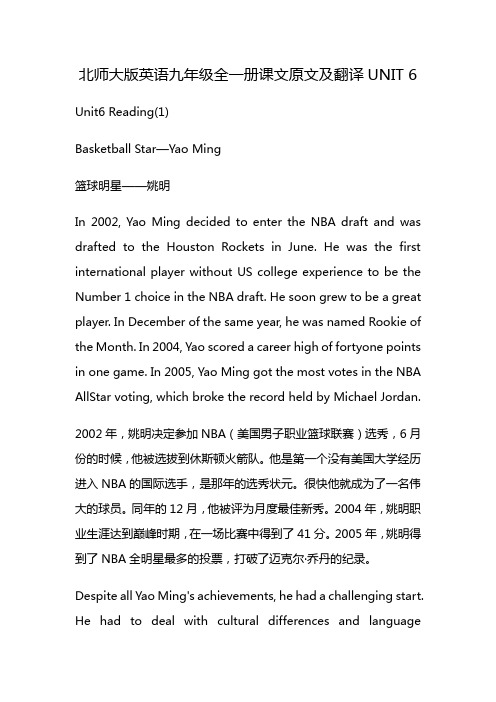
北师大版英语九年级全一册课文原文及翻译UNIT 6Unit6 Reading(1)Basketball Star—Yao Ming篮球明星——姚明In 2002, Yao Ming decided to enter the NBA draft and was drafted to the Houston Rockets in June. He was the first international player without US college experience to be the Number 1 choice in the NBA draft. He soon grew to be a great player. In December of the same year, he was named Rookie of the Month. In 2004, Yao scored a career high of fortyone points in one game. In 2005, Yao Ming got the most votes in the NBA AllStar voting, which broke the record held by Michael Jordan.2002年,姚明决定参加NBA(美国男子职业篮球联赛)选秀,6月份的时候,他被选拔到休斯顿火箭队。
他是第一个没有美国大学经历进入NBA的国际选手,是那年的选秀状元。
很快他就成为了一名伟大的球员。
同年的12月,他被评为月度最佳新秀。
2004年,姚明职业生涯达到巅峰时期,在一场比赛中得到了41分。
2005年,姚明得到了NBA全明星最多的投票,打破了迈克尔·乔丹的纪录。
Despite all Yao Ming's achievements, he had a challenging start. He had to deal with cultural differences and languagedifficulties when he tried to municate with his teammates. But his personality and hard work helped him to win his teammates' and his fans' respect. He worked hard and was always trying to improve. The training paid off for him, and for his fans.尽管姚明取得了重大的成就,他刚开始的时候却面临挑战。
尊敬的先生/女士:
我写此信的目的是想应聘贵公司在7月20日版《南方周末》报上登的招聘广告中提到的总经理秘书一职。
我今年22岁,性格外向,富有合作精神。
2006年,我毕业于长沙旅游商贸技术学院,专业是商务英语。
在校期间,我的各专业课成绩优秀。
同时,我还做了一些兼职工作,从中获得了很多实践经验。
毕业后,我一直担任秘书工作,处理过各类商务信函及报告,已经很有经验了。
目前,我正在找一份新的富有挑战性的工作。
贵公司提供的总经理秘书这个职位正是我想
找的。
我想我完全能胜任这份工作。
随信附上简历,如蒙抽空阅读,感激不尽。
如需其他信息,请随时和我联系。
希望能有机
会和您面谈。
期待您的早日答复。
您真诚的,
王琳。